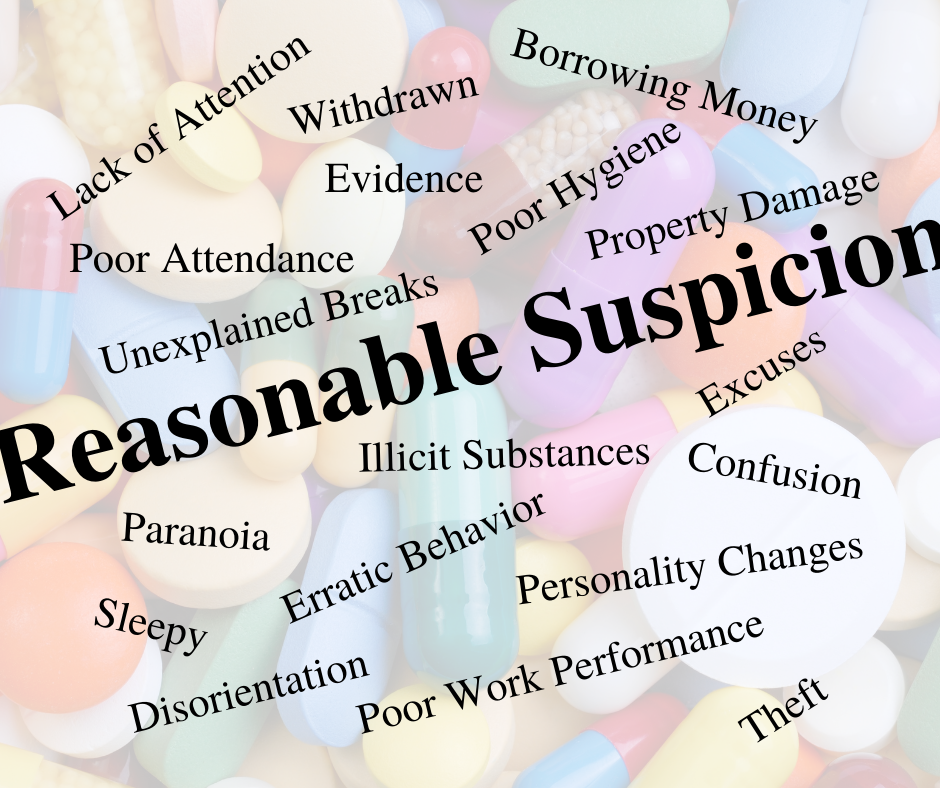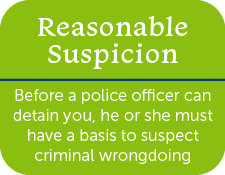In Your Own Words Please Describe What Reasonable Suspicion Means
It is regarded as being more than thinking a crime has been committed but less than probable cause. In addition before conducting a pat-down officers must reasonably suspect that a subject is armed and dangerous.

What Is Reasonable Suspicion Drug Testing Lobdock Impairment Detection
Reasonable suspicion means that the officer has sufficient knowledge to believe that criminal activity is at hand.

. Holding on Stumbling Unable to walk. Reasonable suspicion is a legal standard of proof in the United States that is less stringent than probable cause the legal standard for arrests and warrants. Examples of reasonable suspicion in a sentence how to use it.
It must be based on specific and articulable facts taken together with rational inferences from those facts and the suspicion must be linked to a specific individual. Reasonable suspicion is a less demanding standard than probable cause not only in the sense that reasonable suspicion can be established with information that is different in quantity or content than that required to establish probable cause but also in the sense that reasonable suspicion can arise from information that is less reliable than that required to show. This also holds true for searching a vehicle.
Reasonable suspicion means an officer can detain ie. A reasonable suspicion lies between a mere suspicion and reasonable and probable grounds. Reasonable suspicion means that any reasonable person would suspect that a crime was in the process of being committed had been committed or was going to be committed very soon.
The term reasonable suspicion refers to the fact that Police officers in Australia cannot search individuals prior to arresting them unless an officer has reason to think that the suspect is in violation of the law. Up to 25 cash back Define mere suspicion reasonable suspicion and probable cause. An officer has reasonable suspicion when there are facts or circumstances present which indicate that a crime has been is being or will be committed.
Reasonable suspicion is a legal standard that applies in different criminal-law contexts most often where searches and seizures are involved. An objectively justifiable suspicion that is based on specific facts or circumstances that justifies stopping and sometimes searching as by frisking a person thought to be involved in criminal activity at the time. Where Other is checked please describe.
Reasonable suspicion uses the reasonable person standard Would a reasonable person believe criminal activity was at hand and further investigation was. Is he attributing to that a subjective reasonable suspicion or an objective. Reasonable suspicion does not allow for.
Temporary detention requires only reasonable suspicion not probable cause. It also means that reasonable suspicion does not need to be the only. If reasonable suspicion exists investigators can detain frisk and question the person or.
Investigate you if they have specific and articulate facts that you are have been are presently or soon will be involved in criminal activity. Special law enforcement concerns will sometimes justify highway stops without any individualized suspicion. Multitude of Conclusions Possible.
If the police have reasonable suspicion it means they are acting on specific facts and inferences regarding a specific person. Reasonable Suspicion reasonable suspicion n. Reasonable suspicion is a legal standard of proof in United States law that is less than probable cause the legal standard for arrests and warrants but more than an inchoate and unparticularized suspicion or hunch.
Reasonable suspicion is the legal standard by which a police officer has the right to briefly detain a suspect for investigatory purposes and frisk the outside of their clothing for weapons but not drugs. Based upon articulable facts that criminal activity is afoot in order to detain person not arrest -detention must be no longer than necessary to conduct a. The use of a narcotics detection dog to walk around the exterior of a car subject to a valid traffic stop does not require reasonable explainable suspicion.
While many factors contribute to a police officers level of authority in a given situation the reasonable suspicion standard requires facts or circumstances that would lead a. The standards for reasonable suspicion and probable cause were established by the US. It must be based on specific and articulable facts taken together with rational inferences from those facts.
Legal Definition of reasonable suspicion. Reasonable suspicion does not require that it be the only possibility but merely one possible conclusion based on supported facts. This level of knowledge is less than that of probable cause so reasonable suspicion is usually used to justify a brief frisk in a public area or a traffic stop at roadside.
Suspicion of criminal activity based on specific and objective grounds as a legal justification for a search especially by a police officer or other action. An objectively justifiable suspicion that is based on specific facts or circumstances and that justifies stopping and sometimes searching as by frisking a person thought to be involved in criminal activity at the time see also reasonable cause at cause sense 2 compare probable cause at cause sense 2 terry stop. Explain when an officer is able to legally stop a - Answered by a verified Writer We use cookies to give you the best possible experience on our website.
Reasonable suspicion is a commonly used term in law enforcement. This is your Fourth Amendment. When there is reasonable suspicion that an employee at work is unfit for duty the supervisor or manager observing the behavior as well as another supervisormanager as witness if possible must complete the checklist below.
Without the reasonable suspicion that the vehicle contains illegal items it cannot lawfully be searched by the police. It describes the right of the people to be secure in their persons houses papers and effects against unreasonable searches and seizures It is important for each American to focus on some basics and decideseparate and apart from what the Justices saywhat this vital amendment means. Supreme Court and while these concepts share similarities they are.
Legal Repercussions of Reasonable Suspicion - If an officer has reasonable suspicion in a situation he may frisk or detain the suspect briefly. It requires that officers have an objectively reasonable basis for suspecting criminal activity before detaining someone. Reasonable suspicion and probable cause are two concepts that law enforcement employs when determining whether to detain someone for questioning search for and seize evidence or make an arrest.

What S The Difference Between Probable Cause And Reasonable Suspicion Sanctuary Bail Bonds

What Is Reasonable Suspicion Abilheira Law Llc

Do The Police Need Probable Cause To Conduct A Traffic Stop Jason Dunkle Law
Comments
Post a Comment